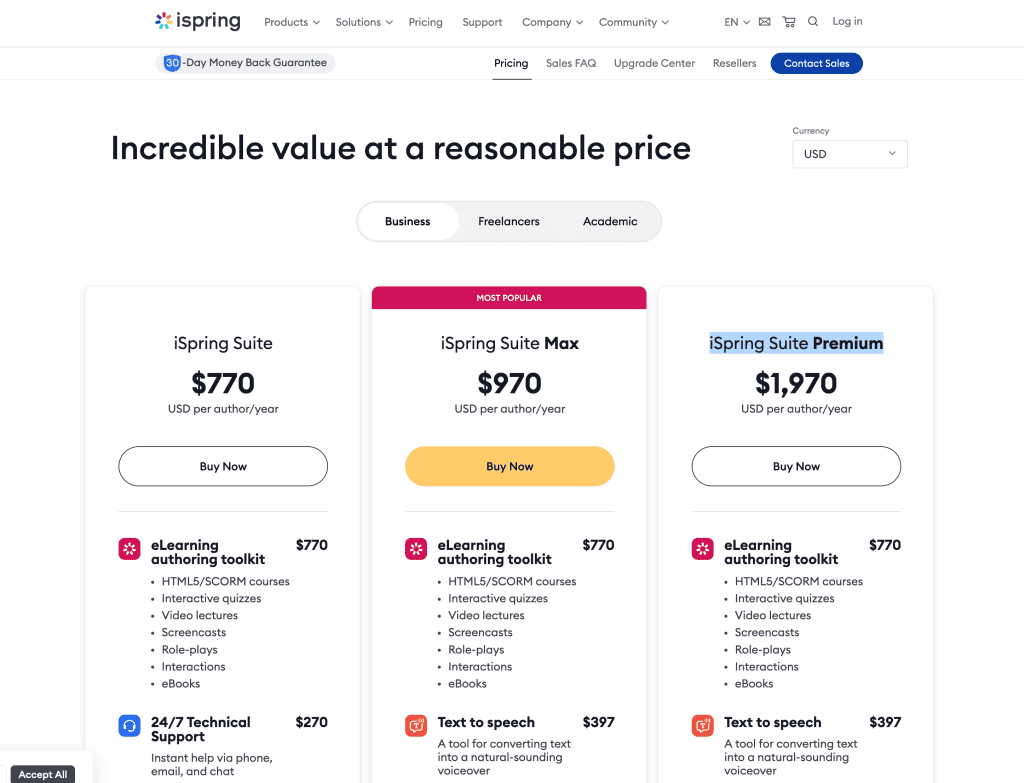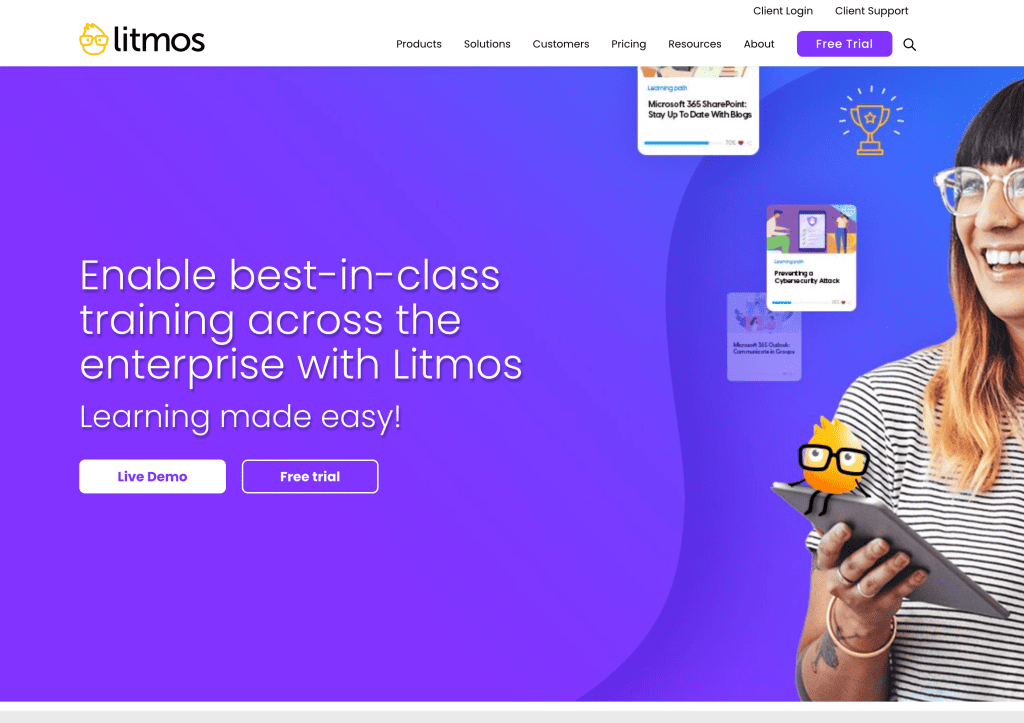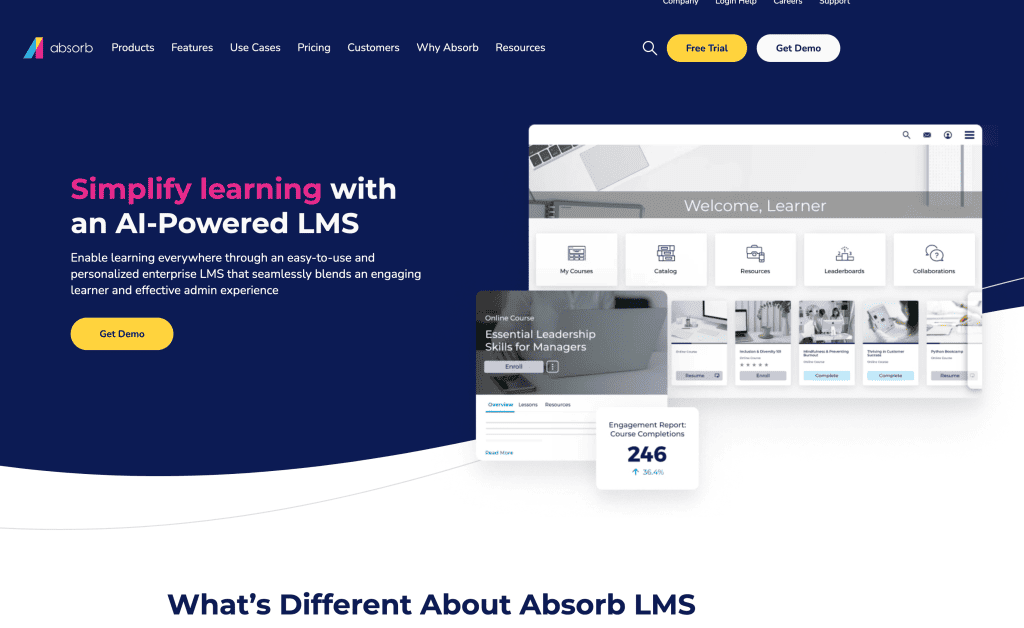Top SCORM-Compliant LMS Platforms
In today’s digitally-driven world, learning management systems (LMS) have emerged as an essential tool for organizations and educational institutions. An LMS is a web-based platform designed to manage, track, and facilitate the delivery of online training and educational content. Among the several standards in eLearning, the Shareable Content Object Reference Model (SCORM) has become the most widely adopted. This standard allows seamless integration between content and the LMS, enabling organizations to create, deliver, and track SCORM-compliant courses efficiently.
SCORM-compliant LMS platforms provide an improved learning experience that adapts to learners’ needs by supporting different content types and ensuring a consistent and compatible learning experience. Organizations choosing a SCORM-compliant LMS must consider factors such as the LMS’s ability to support SCORM 1.2 and SCORM 2004, as well as ease of use, customization features, and accessibility. Open-source and cloud-based LMS options are available, offering varying levels of functionality, support, and pricing to meet diverse needs.
Key Takeaways
- SCORM-compliant learning management systems offer a consistent and compatible learning experience.
- When choosing a suitable SCORM-compliant LMS, consider factors such as version support, ease of use, and customization options.
- Open-source and cloud-based LMS options provide flexibility for organizations with different budgets and requirements.
What Is a SCORM-Compliant LMS?
A SCORM-Compliant LMS is a learning management system (LMS) that supports the Sharable Content Object Reference Model (SCORM), a widely recognized standard for creating and sharing online training materials. This compatibility allows content creators to develop, import, and share SCORM-compliant courses and training materials, ensuring seamless interactivity and consistent learning experiences for users.
SCORM defines two primary versions: SCORM 1.2 and SCORM 2004. SCORM 1.2 is an older version yet still widely used, while SCORM 2004 introduces more advanced functionalities and improved tracking capabilities. When evaluating an LMS, it’s essential to confirm its compatibility with the appropriate SCORM version for your training needs.
A well-designed SCORM-compliant LMS offers the following advantages:
- Interoperability: The ability to import, export, and share SCORM-compliant content between different LMS platforms, facilitating collaboration among organizations and reducing duplicated efforts.
- Reusability: Content creators can easily reuse and update SCORM-compliant training materials across various LMS platforms.
- Consistency: The SCORM standard ensures that learners experience consistent and accurate content presentation, regardless of the LMS software.
- Tracking and Reporting: LMS platforms supporting SCORM can track and report learners’ progress, completions, and scores, significantly enhancing an organization’s ability to monitor and assess employee learning outcomes.
There are various SCORM-compliant LMS choices available, ranging from open-source solutions to cloud-based LMS platforms. Some well-known examples include:
- iSpring Learn LMS
- Moodle
- TalentLMS
- Absorb LMS
- LifterLMS
In summary, a SCORM-compliant LMS supports the widely accepted standard for creating and sharing online training materials, allowing content creators and organizations to create consistent and interactive learning experiences. Choosing the right SCORM-compliant LMS depends on multiple factors, such as compatibility with SCORM versions, user interface, pricing, and overall functionality.
A COMPLETE STEP-BY-STEP CHEATSHEET
TO CREATING, LAUNCHING & GROWING A SUCCESSFUL MEMBERSHIP WEBSITE

How Do You Choose the Right SCORM-Compliant LMS?
When selecting a SCORM-compliant LMS, it’s crucial to keep several factors in mind to ensure the best fit for your organization’s needs. This will significantly enhance the learning experience and make it easier to manage online training programs.
Understand different versions of SCORM: Familiarize yourself with the different versions of SCORM available, such as SCORM 1.2 and SCORM 2004. Some LMS platforms support one or both types of SCORM standards, so it’s essential to know your organization’s requirements.
Identify core LMS features: Make a list of the essential features your organization requires from an LMS platform, for instance:
- Ease of course creation
- Integration with other tools
- Customization possibilities
- Reporting and analytics
- Mobile compatibility
- User experience
Compare top SCORM-compliant LMS options: Research the highest-rated SCORM-compliant LMS platforms. Some notable options are Absorb LMS, Litmos, and TalentLMS. Compare their features, pricing, and customer reviews to see which one is best suited for your organization.
Consider scalability and future growth: Choose a SCORM-compliant LMS platform that is scalable and can grow with your organization. Moving to a new platform later may be costly and time-consuming. Consider cloud-based LMS options for more effortless scalability.
Evaluate support for existing SCORM content: If your organization already has existing SCORM packages, make sure that the LMS you choose is compatible and can easily handle this content.
Take advantage of free trials: Many LMS platforms offer free trials, allowing you to test their features and user experience before committing. Use this opportunity to make an informed decision.
By following these guidelines, you can confidently choose the right SCORM-compliant LMS that best meets the needs of your organization and provides an optimal learning experience for your users.
SCORM Compliant Content Authoring Tool
A SCORM-compliant content authoring tool is a crucial feature of any learning management system (LMS). With this tool, users can create engaging and interactive courses, which adhere to the SCORM standard, ensuring seamless integration with various SCORM-compliant LMSs. This section will briefly break down the key aspects that make up a reliable SCORM-compliant content authoring tool.
The authoring tool should support the creation of different types of learning content for diverse learner needs. The types of content include:
- Text: for introductory information presentation
- Images: to support visual learning
- Videos: for enhancing learner engagement
- Interactive elements: such as quizzes and assessments
- Simulations: for immersive learning experiences
In addition to supporting diverse content, a SCORM-compliant content authoring tool must also be easy to use. This means having a user-friendly interface, with features such as:
- Drag-and-drop functionality
- Pre-built templates
- Customizable designs/layouts
To further enhance learner engagement, SCORM-compliant content authoring tools should allow for course personalization by incorporating:
- Learning paths: based on learner progress
- Gamification: to motivate learners with rewards and recognition
- Adaptive learning: to adjust course content based on individual learner progress
Moreover, a high-quality SCORM-compliant content authoring tool should be able to generate proper SCORM packages in accordance with the SCORM 1.2 or SCORM 2004 standard, depending on user preference.
Finally, the tool should offer easy integration of SCORM content within the LMS by allowing users to:
- Upload SCORM packages directly to the LMS
- Preview SCORM content within the LMS
- Track learner progress and performance
By ensuring that the SCORM-compliant content authoring tool offers these essential features and capabilities, LMS users can create high-quality eLearning courses efficiently and effectively for a successful online learning experience.
Benefits of Being SCORM Compliant
Being SCORM compliant offers several advantages to organizations that utilize eLearning courses and learning management systems (LMS). These benefits include interoperability, cost-effectiveness, flexibility, and accurate tracking of learner progress.
Interoperability
One of the primary benefits of SCORM compliance is interoperability. This means that SCORM-compliant courses can be easily shared and utilized across different LMS platforms without the need for extensive modifications. This eliminates the hassle of creating multiple versions of the same course for different LMS platforms, freeing up time and resources.
Cost-effectiveness
Organizations that choose SCORM-compliant content and LMS platforms benefit from increased cost-effectiveness. By selecting SCORM-compliant options, businesses can easily integrate existing SCORM courses without needing additional customization. This allows organizations to save money on training material development and avoid issues related to compatibility.
Flexibility
SCORM compliance promotes flexibility by allowing organizations to mix and match content from various sources. This enables businesses to create custom learning experiences tailored to the specific needs of their users. Companies can easily update or replace individual SCORM packages within a course, ensuring the learning material remains relevant and up-to-date.
Accurate Tracking
SCORM-compliant LMS platforms offer accurate tracking of learner progress, allowing organizations to gain insight into their employees’ learning experience. Thanks to standardized data reporting, employers can obtain valuable information on learner performance, such as the completion status of courses, time spent, and quiz scores. This data is crucial for informed decision-making regarding employee training and overall learning effectiveness.
In summary, adopting SCORM-compliant content and LMS platforms gives organizations the advantage of interoperability, cost-effectiveness, flexibility in course design, and accurate tracking of learner progress. By choosing SCORM-compliant solutions, businesses can ensure a seamless and efficient eLearning experience for their employees.
Popular SCORM LMSs
iSpring Learn LMS
iSpring Learn LMS is a user-friendly, feature-rich learning management system that is SCORM 1.2 and SCORM 2004 compliant. This platform is well-suited for businesses of all sizes and supports:
- Course creation
- Progress tracking
- Reporting
iSpring Learn offers a free trial, allowing users to test the platform and its capabilities before committing to a subscription.
Prices iSpring Suite $770 | iSpring Suite Max $970 | iSpring Suite Premium $1,970
Tovuti
Tovuti is an all-in-one, cloud-based LMS that is fully SCORM compliant. It provides a customizable and interactive learning experience and includes:
- Gamification
- Social learning
- Integrated webinars
- eCommerce
With its robust feature set, Tovuti is an excellent choice for organizations seeking a comprehensive online training solution.
Prices Starting 1 year $11,160
Litmos
Litmos is an accessible, cloud-based LMS featuring SCORM 1.2 and SCORM 2004 compliance. The platform simplifies online course creation and management and offers:
- Mobile compatibility
- Content Library
- Reporting tools
This LMS is particularly popular among growing businesses and enterprises.
Absorb LMS
Absorb LMS is an award-winning, scalable learning management system supporting SCORM 1.2 and SCORM 2004 standards. Key features include:
- eCommerce integration
- Custom branding
- Automation
Absorb LMS offers an intuitive interface for learners, making it an attractive choice for any organization.
Prices (Price on Request)
LifterLMS
LifterLMS is a popular, open-source LMS that supports SCORM packages and can be easily integrated with WordPress. The platform stands out for its:
- Affordable pricing
- Course creation tools
- Membership options
LifterLMS is an ideal choice for small businesses, educators, and developers.
Prices Free | Earth Bundle $199 per year | Universe Bundle $360 per year | Infinity Bundle $1,200 per year
LearnDash
LearnDash is a WordPress LMS that is compatible with SCORM 1.2 content. This platform is easy to set up and boasts features such as:
- Mobile responsiveness
- Gamification
- Group management
LearnDash is a popular choice for businesses, schools, and universities.
Prices $199 per year
GrassBlade xAPI Companion
The GrassBlade xAPI Companion is a powerful plugin that enables SCORM 1.2, SCORM 2004, and xAPI support within various LMS platforms such as WordPress, LearnDash, and LifterLMS. Its core features include:
- Detailed reporting
- Interactive content support
- Compatibility with multiple LMSs
The GrassBlade xAPI Companion is the perfect addition to any LMS looking to expand its capability and support SCORM content standards.
Prices $198 per year
The Challenges of SCORM-Compliant LMS
Easily Upload Off-the-Shelf Course Content
One of the challenges faced by SCORM-compliant LMS users is the ability to upload and implement off-the-shelf course content easily. Some SCORM-compliant LMS platforms might not provide a streamlined process for importing and integrating these pre-built courses. Consequently, this may require manual adjustments and additional efforts when migrating content between different platforms, affecting the overall learning experience.
Interoperability
Another challenge is achieving interoperability among various LMS platforms. The SCORM standard, though designed to ensure content compatibility, is available in multiple versions, such as SCORM 1.2 and SCORM 2004. These versions can cause compatibility issues when transferring content or trying to run a course created for a specific SCORM version.
For example, an LMS that supports SCORM 1.2 may not be fully compatible with content created for SCORM 2004. This issue can make it difficult for organizations to migrate or shift their course libraries to a new LMS platform and lead to extra time and resources spent on troubleshooting and reworking the content.
Affordability
Affordability is another concern when choosing a SCORM-compliant LMS. There is often a wide range of LMS options available on the market, some being more expensive than others. Moreover, the cost of a SCORM-compliant LMS might vary based on features, support, scalability, and licensing options. This can make it more challenging for organizations to identify the most cost-effective and suitable LMS while still adhering to the SCORM standards.
In conclusion, while SCORM-compliant LMS platforms offer a range of benefits, such as standardized course content and easier tracking of learning progress, organizations face challenges in terms of uploading off-the-shelf course content, ensuring interoperability, and finding affordable options.
Frequently Asked Questions
Q: What is SCORM, and why is it essential in the context of learning management systems?
A: SCORM stands for Shareable Content Object Reference Model. It is a set of technical standards for e-learning software products. SCORM ensures that all e-learning content, such as courses, quizzes, and simulations, can be used across different learning management systems (LMS) in a consistent manner.
Q: How can I choose the best SCORM-compliant LMS for my organization?
A: When choosing the best SCORM-compliant LMS, consider factors like your organization’s specific learning needs, budget, technical support, and user interface. Additionally, prioritize LMS platforms that have a proven track record of SCORM compliance and positive user feedback.
Q: What are the advantages of using a SCORM-compliant LMS?
A: SCORM-compliant LMS enables seamless integration of various e-learning content and tools, ensuring interoperability across different platforms. It also allows for better tracking and reporting of learners’ progress and performance, thereby enhancing the overall learning experience.
Q: Are there any open-source SCORM-compliant LMS options available?
A: Yes, there are several open-source LMS that are SCORM-compliant, offering flexibility and cost-effectiveness. Examples of popular open-source SCORM-compliant LMS include Moodle, Sakai, and ILIAS.
Q: How can I create SCORM-compliant e-learning content?
A: To create SCORM-compliant content, you can use authoring tools that support SCORM standards, such as Articulate Storyline, Adobe Captivate, or Lectora. These tools enable you to develop e-learning content that adheres to SCORM protocols for seamless integration with SCORM-compliant LMS platforms.
Q: Can I test a SCORM-compliant LMS before making a purchase?
A: Many LMS providers offer free trials or demo versions of their platforms, allowing you to test the SCORM compliance, user interface, and functionality before making a commitment. It’s advisable to take advantage of these trial offerings to ensure the LMS meets your organization’s requirements.
Q: What should I consider when looking for the best SCORM-compliant LMS for online course delivery?
A: When selecting a SCORM-compliant LMS for online course delivery, factors to consider include ease of content upload, user-friendly interface, robust reporting and tracking capabilities, mobile compatibility, and scalability to accommodate future growth.
Q: What are some of the top SCORM-compliant LMS options available in the market?
A: Some of the leading SCORM-compliant LMS platforms in the market include Adobe Captivate Prime, Docebo, Cornerstone OnDemand, Moodle, and TalentLMS. These platforms are recognized for their SCORM compliance, feature-rich capabilities, and user-friendly interfaces.
Q: Do I need SCORM-compliant capabilities if I am using an LMS for employee training and development?
A: Yes, having a SCORM-compliant LMS is crucial for practical employee training and development, as it ensures seamless integration of e-learning content, simplifies content sharing across platforms, and provides robust tracking and reporting features to monitor employees’ progress and performance.
Q: Can you recommend a SCORM-compliant LMS for creating and delivering online training courses for a small business?
A: For a small business, some recommended SCORM-compliant LMS options include TalentLMS, Moodle, and Adobe Captivate Prime. These platforms offer user-friendly interfaces, scalability, and robust SCORM compliance to deliver online training courses effectively.
Final Thoughts
In recent years, the demand for SCORM-compliant LMS platforms has surged due to the growing need for practical online training and education solutions. As of December 2023, numerous LMS platforms provide support for different versions of SCORM, such as SCORM 1.2 and SCORM 2004.
Selecting the best SCORM-compliant LMS for your organization depends on several factors, including:
- Integration: Ensure that the chosen LMS integrates seamlessly with your existing systems, learning content, and infrastructure.
- Features: Look for a platform that offers robust functionalities, such as collaborative learning, course creation tools, and content management.
- Usability: Consider both the user experience for learners and the ease of administration for course creators and managers.
- Scalability: Opt for an LMS that can scale to accommodate your organization’s growth and evolving training needs.
- Cost: Investigate the pricing options and choose an LMS that fits within your budget and offers the best value for your investment.
Some popular choices for SCORM-compliant LMS platforms are:
- Absorb LMS
- Cloud-based LMS
- Open-source LMS
It is essential to thoroughly research and compare different LMS options before making a final decision, understand the features they offer, and assess their compatibility with your organization’s requirements. An all-in-one LMS platform, which supports various learning standards, can be the optimal solution.
Finally, always be attentive to the continuous evolvement of learning technologies and standards as your organization develops its online training initiatives. This will help you stay on top of the advancements and maintain an engaging, efficient, and up-to-date learning experience for your learners.









